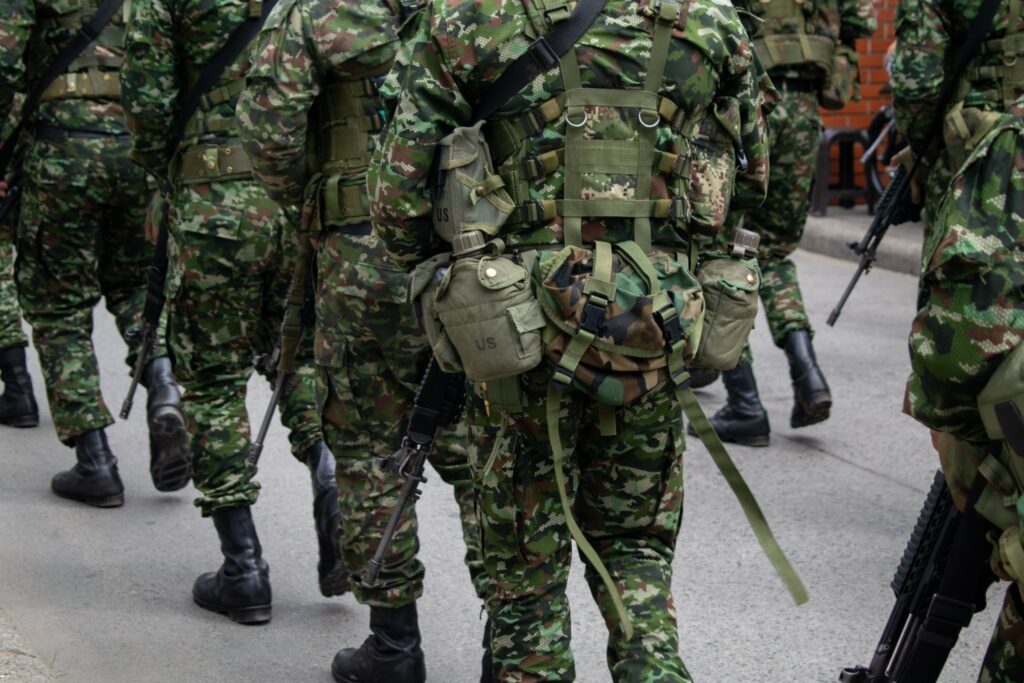18 Mar Colombia at a Crossroads: New Leadership, New Strategy, Uncertain Future
By,
Jaime (Jimmy) González, Senior Fellow | MSI2
Since assuming office in August 2022, President Petro has reshaped Colombia’s security policies. He prioritized demilitarization and peace negotiations over military deterrence. This strategy removed more than 50 high-ranking military officers, including generals and admirals. It was one of the most extensive leadership overhauls in Colombian history.
Next, in February, Defense Minister Iván Velásquez resigned. He had been appointed in 2022 and was a key player in Petro’s military reforms. His resignation highlighted deeper problems in defense strategy and U.S. relations, including counter-narcotics operations, intelligence-sharing, and military aid. Instead of appointing a civilian as defense minister, Petro selected General Pedro Sánchez, an active-duty Air Force officer. Sánchez is widely respected for leading the rescue of four indigenous children in the Amazon rainforest. This historic appointment marked the first time in over three decades that an active-duty military officer became Defense Minister. This move aimed to restore trust with the military, which had resisted Petro’s reforms. Recently, the Colombian press stated that General Sanchez plans to retire to prevent the retirement of 35 active-duty generals. However, the success of this appointment depends on whether Sánchez has the autonomy to balance security with reform.
Unarmed and Unready: The Shrinking Colombian Military
President Petro, a former M-19 guerrilla member, became Colombia’s first leftist president in August 2022 and launched sweeping military reforms. The removal of high-ranking officers was more than a leadership change. It aimed to align the military with Petro’s “Total Peace” policy, prioritizing negotiations over armed conflict. However, these peace efforts have largely failed. Insurgent groups have expanded their control and criminal activities. These include child recruitment, extortion, and drug trafficking. As a result, many in the military saw this as a threat to stability. Petro’s approach has weakened the armed forces’ institutional effectiveness, leading to strained civil-military relations.
From my experience working with the Colombian military, I observed a clear pattern. Officers politically aligned with Petro replaced experienced leaders. This damaged trust and weakened cohesion. Then, military officers faced uncertainty about their careers and the institution’s future. Furthermore, after years of perfecting the development and implementation of elite task forces, Petro decided they were no longer needed, deactivating military units like Omega, Titán, Hércules, Marte, and Quirón. This created security vacuums, allowing insurgent groups to expand. Meanwhile, Petro’s policies continue to reduce the military’s autonomy, shifting priorities toward peace talks, human rights, and institutional accountability.

A Turning Point or a Deepening Divide?
In Colombia, as in many other countries, the position of Defense Minister is critical to national security and the broader governance framework. Although Petro accepted the resignation of Vazquez as part of Petro’s total overhaul of his cabinet, historically, since the 1980s, each president has had at least three defense ministers per term. Petro stated that his decision to appoint a new minister was due to incumbents not meeting his expectations.
Therefore, the appointment of an Air Force general may signal Petro’s desire for a fresh perspective in defense. Appointing an active-duty or recently retired military officer as Defense Minister has the potential to either strengthen or weaken civil-military relations in Colombia. On the one hand, it could improve cooperation between civilian and military leadership, leading to a more effective national security policy. On the other hand, it could deepen divisions and fuel suspicions about military autonomy. If military officers view the appointment as a reinforcement of their security role, it could strengthen their influence over policy at the expense of civilian oversight.
If General Sánchez had the authority to strengthen intelligence operations and elite forces, military readiness could improve. However, budget constraints pose a challenge. Defense funding has been reduced, affecting training, equipment modernization, and operations. Reversing these cuts is crucial for effectiveness and morale. The administration must balance peace talks with military deterrence. Insurgent groups may not negotiate in good faith without a strong security force. This could destabilize the country and alter relations with the United States, a key strategic partner for over two decades.
U.S.-Colombia Military Relations in Flux
General Sánchez’s appointment comes at a delicate time for U.S.-Colombia military relations. The Petro administration’s shift toward demilitarization represents a break from past counterinsurgency strategies. As a result, concerns have arisen about Colombia’s ability to maintain joint security operations with the U.S. For decades, the U.S. has considered Colombia a key security partner. It has provided billions in military aid through Plan Colombia and similar programs. However, some U.S. policymakers now question Colombia’s commitment to counterinsurgency. Washington has already frozen some military aid, believing Petro’s policies have weakened counter-narcotics and counterterrorism efforts. If General Sánchez’s appointment restores some cooperation, it could signal that Colombia still values military capabilities.
Another concern is Colombia’s growing ties with Venezuela. Petro’s administration has increased security cooperation and intelligence-sharing with President Nicolás Maduro. Reports suggest Colombia has shared military intelligence with Venezuela. The United States intelligence community is concerned that shared intelligence with Colombia may be compromised under bilateral intelligence agreements and defense working groups. Intelligence sharing has been pivotal in joint counter-narcotics operations. For instance, Operation Orion, a collaborative effort involving the United States, Colombia, and other international partners, led to the seizure of significant quantities of narcotics and the disruption of trafficking routes. Such operations underscore the effectiveness of bilateral intelligence cooperation with Colombia in addressing transnational crime. If Colombia strengthens ties with Venezuela, US-Colombia defense and security relations could most likely deteriorate.
Future Prospects and Strategic Considerations
The next 12 to 18 months will be crucial. While Petro’s move may ease tensions with the military, long-term success depends on whether the new minister has real authority. The administration must choose between continuing restructuring, rebuilding trust with the armed forces, or a hybrid approach.
Scenario 1: Continued Military Restructuring
- More high-ranking officers may be removed and replaced with Petro-aligned personnel.
- Counterinsurgency task forces may be further dismantled, weakening Colombia’s security forces.
- The military may struggle with retirements, reduced budgets, and limited operational readiness.
- Reports indicate insurgent activity is rising in Catatumbo and Cúcuta due to limited surveillance.
Scenario 2: Rebuilding Military Relations
- The government could halt or reverse restructuring efforts.
- Recent investments in armored vehicles, frigates, and fighter jets suggest military strengthening.
- Security operations could be reinforced where insurgents are gaining ground.
Scenario 3: A Hybrid Approach
- A balance between peace talks and military deterrence could stabilize the country.
- Instead of abandoning traditional enforcement entirely, Colombia could implement a hybrid model, integrating selective counterinsurgency operations with peace-building efforts.
- This approach would allow the military to maintain operational readiness while aligning with gradual peace negotiations.
- However, this shift may prove that Petro’s initial reforms were ineffective.
MSI² Major SIG® Conclusions
President Petro’s appointment of General Sánchez as Defense Minister marks a critical moment in civil-military relations. This decision can potentially repair trust, but its success depends on granting the military absolute autonomy under close but civilian oversight. Next, national security and U.S.-Colombia defense cooperation remain uncertain. Maintaining and adapting intelligence-sharing agreements will be crucial for both nations to address evolving security threats effectively. The Petro administration must balance peace efforts with maintaining a capable military force. If it fails, Colombia risks more excellent insurgent activity, reduced territorial control, and a decline in U.S. support.
